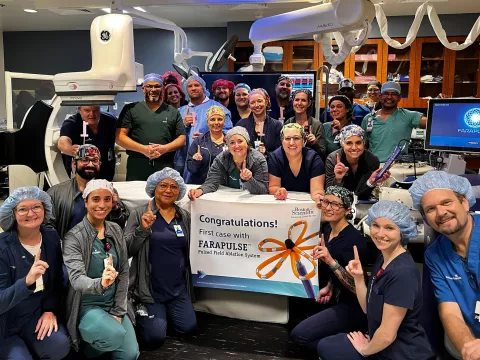- AdventHealth
Thoracic surgeon Colleen Gaughan, MD, and her team at AdventHealth Celebration, recently became one of the first in the country to incorporate targeted imaging agent Cytalux (pafolacianine) as part of a new intraoperative molecular imaging (IMI) process designed to enhance the accuracy of lung cancer surgeries. This injectable medication, administered up to 24 hours before surgery, binds to cancerous tissue and glows when stimulated by a specialized intraoperative infrared camera, making it easier for the surgeon to accurately visualize and remove tumors while sparing healthy tissue.
Addressing the Challenge of Lung Cancer — How Cytalux Helps
Lung cancer remains the leading cause of cancer deaths in the U.S. with a 26.6% survival rate. If diagnosed early, before it has spread, lung cancer can often be treated with surgery. In 2023, surgery was performed in 20.8% of cases. However 30-70% of lung cancer patients suffer recurrence after surgery.
“Achieving accurate margins in lung cancer resection has always posed a challenge because standard visual and tactile methods often fail to fully detect all of the malignant tissue,” explains Dr. Gaughan.
Cytalux binds to a surface protein called the folate receptor alpha (FRα), which is expressed at abnormally high levels in lung tumors. It was approved by the U.S. Food and Drug Administration (FDA) in December 2022 to help identify malignant and non-malignant pulmonary lesions in adult patients with known or suspected cancer in the lung during surgery. The FDA had previously granted approval for its use in ovarian cancer surgery.
Improving Tumor Identification and Surgical Margins
FDA approval of Cytalux was based on the results of the ELUCIDATE trial, which concluded that IMI with Cytalux improved surgical outcomes by identifying occult tumors and close surgical margins. Specific findings published in the Journal of Thoracic Cardiovascular Surgery included the following:
- In 38% of patients, Cytalux helped surgeons identify a resection margin of ≤10mm.
- In 19% of patients, IMI with Cytalux located a primary nodule that the surgeon could not locate with white light and palpation.
- In 8% of patients, IMI with Cytalux helped identify one or more synchronous malignant lesions not detected by pre-operative imaging.
Dr. Gaughan and her team began incorporating the Cytalux IMI process into surgical cases in late 2023 and have performed 14 procedures to date.
“It is like a living PET scan — our time to localization is quicker, we can more accurately assess margins in real time, and we have gained the ability to see synchronous tumors,” she shares. “As a result, we can more precisely remove the cancerous tissue. For patients, this means reducing the need for secondary surgeries and minimizing operating room time.”
Dr. Gaughan also shared that the Cytalux IMI process helps to locate pulmonary ground-glass nodules (GGNs), which have been identified as a potential early signal of lung cancer.
“Ground-glass lesions are highly associated with lung cancer and tend to lie along the natural topography of the lung before they invade and become solid,” she explains. “Traditionally, finding them was like finding a needle in a haystack. Now Cytalux illuminates these small, sub-solid nodules so we can go ahead and remove them while still preserving lung parenchyma.”
Striving to Improve Survival Rates for Patients with Lung Cancer
Last year the American Cancer Society released its updated lung cancer screening guideline, and there have been intensive efforts to improve lung cancer diagnosis with newer technologies like low-dose computed tomography (LDCT) and robotic bronchoscopy.
“Lung cancer screenings are improving, allowing us to detect disease at an earlier stage when it is more curable,” shares Dr. Gaughan. “Tools like Cytalux IMI help our surgeries to remove that cancer become more effective. Together, these advancements represent a beacon of hope for lung cancer patients, offering improved success rates and a brighter future ahead.”
Recent News
Accurately determining food intake remains a challenge in nutrition research. A new study published in Nature Metabolism and co-authored by Dr. Corbin introduces a metagenomics-powered approach to...
Discover what’s being accomplished in Central Florida to bridge the health gap with Orange County Mayor Jerry Demings and AdventHealth’s Dr. Alric Simmonds.
Breakthrough device offers new hope for stroke survivors struggling with rehabilitation following ischemic stroke
Jennifer Seminerio, MD, recently became one of the first in Florida to use intestinal ultrasound (IUS) to help assess and manage treatment of patients with inflammatory bowel disease (IBD). A non...
Physician leaders from AdventHealth’s emergency department, infectious disease, inpatient, pediatrics and pharmacy teams all collaborated to develop a respiratory virus testing algorithm to assist...
On the newest Inspiring Wholeness podcast, Obie Diaz, local morning radio show host, shares how a routine physical eventually led to two open heart surgeries.
AdventHealth recently began piloting a new Genomics Risk Assessment for Cancer and Early Detection (GRACE) program that combines the use of digital mammography, artificial intelligence (AI) technology...
AdventHealth Clinical Research Unit (CRU) Executive Director and Medical Director of Genitourinary Oncology Guru Sonpavde, MD, co-authored an article on the AMBASSADOR Phase III clinical trial results...
A promising new treatment for AFib patients called Pulse Field Ablation is first offered in Central Florida at AdventHealth and shows less damage to tissue.
Plastic and Reconstructive Microsurgeon Sabrina Pavri, MD, and Breast Surgeon Devina McCray, MD, recently began offering immediate neurotization after breast reconstruction, a new surgical technique...
Under the leadership of gynecologist and gynecological surgeon Omar Zwain, MD, AdventHealth for Women opened its new, multidisciplinary Comprehensive Fibroid Program at AdventHealth Winter Park in...
Under the leadership of Medical Director of Genomics and Personalized Health Majed Dasouki, MD, AdventHealth for Children is recruiting patients for a new Phase III clinical trial to evaluate the...












